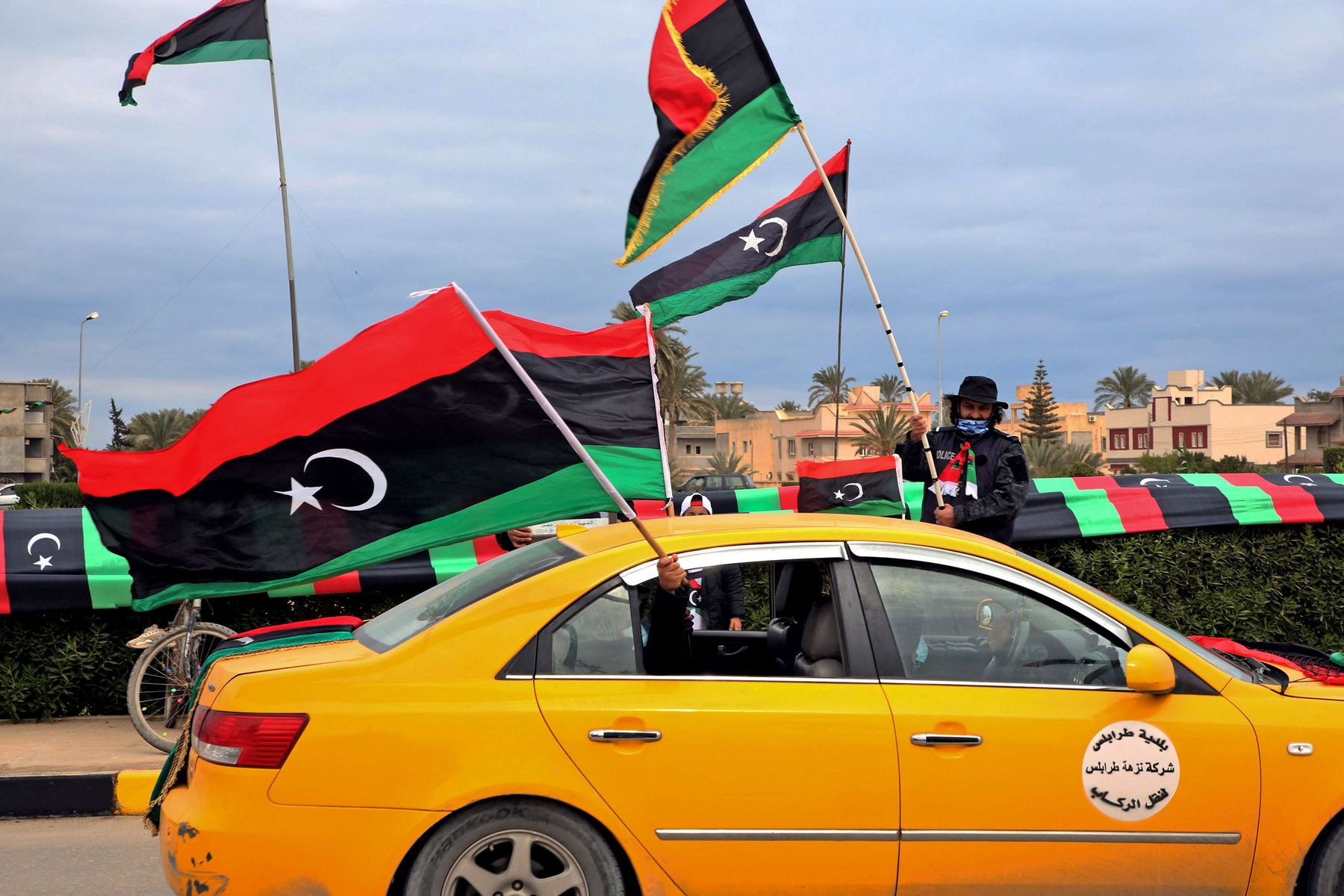On the 10th anniversary of the outbreak of its civil war, a chance has emerged for Libya to reach genuine political settlement: under pressure from Washington, which firmly stepped in after a long pause, Libyans in Geneva elected a new unified transitional government for their country in early February. President-elect of the Presidential Council Mohamed al-Menfi and Prime Minister Abdul Hamid Dbeibeh have been tasked with preparing and holding national elections on 24 December 2021.
Although any political settlement could be derailed at the very last moment, there is a reason to believe that the programme to rebuild the country will be brought to completion. The new professional team in Joe Biden’s administration have demonstrated their readiness to press much harder on the players, and the situation in Libya has changed dramatically over the last year: after his inglorious campaigns against Tripoli, Khalifa Haftar became so ‘toxic’ that he was effectively rejected by Egypt, the region’s key player. Haftar is no longer perceived as ‘the new Gaddafi’ and the prospect of a trial of the self-proclaimed field marshal for the crimes committed by his so-called ‘Libyan National Army’ in Tarhouna is real, without exaggeration.
The election of al-Menfi and Dbeibeh came as a surprise for both Russia and Turkey alike: Moscow and Ankara apparently believed in the election of the people from the list agreed with Cairo, headed by Fathi Bashagha, Interior Minister of the Government of National Accord (GNA) and Aguila Saleh Issa, President of the Libyan House of Representatives in the east of the country.
For Moscow, the results of the Libyan delegates’ vote in Switzerland do not yet signal a collapse. As we have written at length in Riddle, the Russian authorities attempted, at various times, to feign equidistance and build up contacts with other Libyan forces, also in anti-Haftar Tripoli and Misrata. These efforts met with objective interest. Russian military activity, disguised as the interests of businesses and their mercenary structures, such as the PMC Wagner, is one of the methods for various players in the Middle East and North Africa to diversify their ties and extract dividends, even if only tactical ones. Denial of such activity is a way to keep the door open for cooperation with the forces the mercenaries are fighting against. While this does not seem like a very logical scheme, it actually works for Moscow because Russian business structures also compete with one another, sometimes supporting the unpredictable Haftar, another time giving support to the distanced Aguila Saleh, the politically bankrupt Gaddafi’s son Saif al-Islam, or even their opponent Fayez al-Sarraj. Like other players in the region, Moscow expects its contacts with all parties to ‘shoot out’ in the wake of the December elections, and the whole Libyan background with mercenaries and aid to Haftar was generally not useless: it allowed Moscow to establish itself more firmly on the Libyan ground as a force to be reckoned with.
However, these calculations have one serious flaw: Moscow has no legitimate presence in Libya. Active flights of Russian military transport aircraft to Libya, reconnaissance activities of special forces from the Egyptian territory, repair of armoured vehicles and aircraft, the obvious feint with supplying Haftar with Syrian MiG-29 fighters (they were replaced with Russian ones in Assad’s air force), the transfer of fighters from a number of pro-Assad formations and even of fighters from the Islamic State (banned in Russia) who were captured in Syria and, who, according to some reports, were supposed to be decided to be ‘disposed of’ in Libya — all these actions are officially denied by the Kremlin in order to avoid accusations of embargo violations. Even unmanned reconnaissance aircraft from Russia in Libya turned out to be the equipment that is not officially used by the Russian army.
In fact, Moscow relies on UAE’s financial support in Libya and even if it wanted to have official military facilities there, it paradoxically found itself in the same position as the Sudanese or Chadian mercenaries who will have to leave the country in case there is a sustainable political agreement (currently being pushed through by the USA). When Haftar’s defences finally crumbled during a successful counter-offensive by the Tripolitans in 2020, the lenses of local mobile phones captured a fair amount of Russian military equipment and weaponry, not supplied to the late Gaddafi’s Jamahiriya, but also to the neighbouring countries: the Krasukha radioelectronic combat system, the Msta-B towed self-propelled howitzers, the Tigr and Ural armoured vehicles, the Pantsir-S1 anti-aircraft missile and gun system based on the KamAZ-6560 (which distinguishes them from the Emirati ones). However, while some of this equipment may well have been handed over to Russian mercenaries back in Syria, serious air defence systems such as Pantsir‑S1 could have been supplied either from the inventory of the Russian Armed Forces or under a special order (or it may have been leased out from the Syrian Armed Forces).
In 2020, Russian mercenary forces as well as Syrians who supported them were stationed at the Al‑Watiya air force base, in Bani Walid and Tarhouna. If one summarises the information from various sources, they are now deployed in Sirte in the combat order of the Qani 7/9 Brigade forces from Tarhouna, Al-Jufra airbase, El Sharara oil field, Brak and Al-Khadim airbases (the main UAE presence) and Haftar’s Al-Rajma area.
The problem is that while Russian PMCs in Libya cannot ignore instructions from Moscow, they also cannot remain indifferent to the position of the UAE, which plays a central role in organising the activities of the multiple international mercenary units. By and large, it is difficult to determine today who really makes decisions regarding the activities of PMCs and who has the final say. It is possible that the last say remains with Abu Dhabi. The Emirati authorities have adopted such a large-scale approach to the Libyan war, that they reportedly even tried to relocate a battery of U.S. Patriot SAMs to Libya after the deaths of their officers whop operated Panzir-S1 SAMs purchased from Russia.
After the February elections, Russia and the Emirates turned out to be in similar positions: it is important for them to maintain influence in the Sirte-Jufra region even after the new government has moved to Sirte. It cannot be excluded that the UAE will eventually try to «set the world on fire,» which will be easier than coming up with ideas to promote Aguila Saleh, who has been dramatically losing influence.
In order for the Russian security wing to legitimise its presence, it seems logical to reach agreements as soon as possible, at least in Libya’s east, where regular military personnel could officially coexist with «civilian instructors» (Moscow did the same thing in the CAR). The Russian Foreign Ministry and even the Ministry of Industry and Trade have recently intensified contacts with politicians from western Libya. In turn, many politicians from Tripoli have expressed an interest in cooperating with Russia. This also applies to one of the most influential politicians, Fathi Bashagha, the GNA’s Interior Minister, who stands a good chance of being elected president in December 2021. For this reason, it cannot be ruled out that Russia could find understanding for formalising its presence in Libya, including the military presence, by obtaining the consent of the new Libyan authorities. At the same time, if the Russian oil companies have contracts in Libya, this may enable Russia to legalise the presence of PMCs, for example by organising the protection of these facilities. Libya’s National Oil Corporation is having serious problems with staffing the Petroleum Facilities Guard (PFG), which is supposed to protect the fields but is constantly rioting and blocking oil production instead. It should be also borne in mind that Russia already has legal experience of using the official PMCs in Libya. One of them was the RSB Group, which also has contracts for the protection of Libyan embassies, e.g. in Belarus.
Ankara, which has also used mercenaries (Syrian opposition fighters), faces fewer problems in formalising its presence: the Turkish military is present in western Libya under formal agreements. The current and planned economic projects of the Turkish authorities are either linked to European business or have such a large scale that no one will block them. The only potential exception is the economic zone, which has been established on the basis of an agreement with al-Sarraj’s GNA.
The current interim Prime Minister Dbeibah, who was in charge of the country’s housing and utilities sector before the war, is very well familiar with the realities of Russian business, not accustomed to competition and tenders: according to rumours, he had been among the people who caused the Russian-Libyan Business Council and other investor groups to remain only at the level of bold announcements during the Gaddafi era.
However, there are also other influential players in the Libyan field that Moscow can rely on to promote its interests, including political, military and economic ones. Aguila Saleh, who still retains some influence, GNA’s Deputy Prime Minister Ahmed Maitig and other politicians from various regions of the country have direct contacts with Moscow and are interested in pursuing a dialogue. Even Fathi Bashagha seems predisposed towards cooperation, although this is hampered by the domestic Russian agenda: it was the head of the Libyan Interior Ministry who was widely accused of keeping Russian ‘sociologists‘ in Libya.
In any case, the future Libyan statehood promoted by the USA will try to reduce the window of opportunity for Russia, but many will remain dissatisfied with the political process. Most likely, Moscow will try to exploit these sentiments. But the effectiveness of these efforts will remain an open question because, as shown by the experience of Russia’s actions after 2014, Moscow is much better at breaking than at building things.










